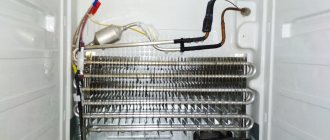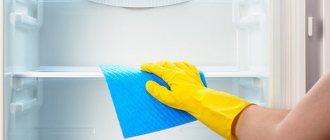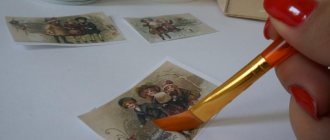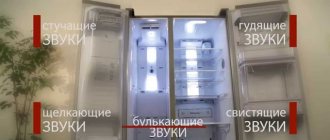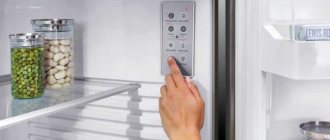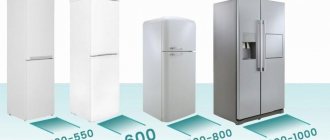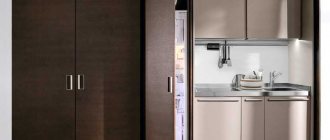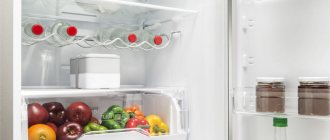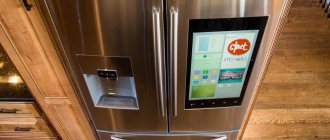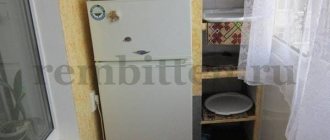During operation, the refrigerator can make a variety of sounds. Many of them are quite normal, which indicates the serviceability of certain systems. Still, there are times when the refrigerator gurgles, and this is no longer normal. The appearance of this sound indicates the presence of a defect, which may become more serious and make repairing the equipment more difficult. Even taking into account that the unit is a complex device, some reasons when it makes bubbling sounds can be identified independently. At the very least, understanding the situation will help the technician most accurately describe the essence of the problem if it is not possible to repair it on your own.
Possible causes of gurgling sounds when the refrigerator is operating
NECESSARILY!
To determine the specific reason why the refrigerator gurgles, you should first familiarize yourself with its structure. The unit consists of a compressor that pumps refrigerants r134a and r12 through the system, which are most often used as a coolant. Due to its low boiling point of -23 degrees, gas is an ideal substance. It compresses and expands well, which ensures the operation of the law of thermodynamics.
Charging the system
In addition to the compressor, the design also contains an evaporator, filter drier, radiators, thermostat, control board and other components. A refrigerant circulates through a closed system, which in its different parts takes on a different state of aggregation. Under normal conditions it is a gas, but when compressed it turns into a liquid. The system also requires oil to protect all components. We list the most likely problems when the refrigerator gurgles and does not freeze:
- Malfunction of the freon circulation system. The refrigerator makes a gurgling sound. The system is leaking freon from the system.
- Malfunction of the compressor, which does not cope with its work. Performs insufficient compression on the workspace.
- A blockage in the pipeline that creates a large pressure difference before and after the blockage.
- A low-quality refrigerant that changes its properties when compressed.
There are quite a few elements in the refrigerator that can make different sounds when operating. In any case, to find a specific breakdown, it is necessary to carry out diagnostics.
Ice
The refrigerator purrs loudly, there are no other complaints about its operation
If the refrigerator makes soft gurgling sounds when operating, then there is no need to worry. Cooling of products in the chambers is carried out precisely due to the circulation of freon through the system. The appearance of a characteristic noise when it rubs against the walls of the tubes is quite normal, unless, of course, the sound becomes too strong. Its appearance is explained by a change in the diameters of the throughput pipes. Accordingly, where there is a narrowing from a larger to a smaller size, the noise intensifies.
Also, refrigerator repairs will not be required when purchasing new equipment. The peculiarity of the new models lies in the type of refrigerant used. Many manufacturers have long switched to R600a. It is a more fluid substance than the common R314a. Accordingly, it will gurgle much louder, which is quite normal.
Fan
IMPORTANT!
Determining what is in the system is quite simple. To do this, you need to look at the passport or the label directly on the compressor. As for the permissible noise level, there is a standardized limit. It constitutes a boundary at 40 dB. If the magnitude of the sounds produced is greater, then you should worry.
One of the reasons why the refrigerator makes strange sounds, gurgles and crackles is a lack of liquid. There is extra space left in the system, which ensures almost unhindered propagation of sound waves. In this case, not only gurgling sounds are felt, but also a knocking sound may occur when the compressor is turned on and off. Such a defect is dangerous and must be eliminated without fail. To do this you will need to do the following:
- Check the pressure in the system. If it is not enough, then most likely there is a refrigerant leak.
- Remove the old filter drier.
- It is necessary to search for the damaged area and drain the fluid from the system.
- Purge the circuit with nitrogen, because there is a large amount of moisture in the compressed air.
- Solder a new filter and fill the system, monitoring the pressure.
In any case, if the refrigerator gurgles, but this has not happened before, this indicates a breakdown or defect. You need to diagnose the problem and find a way to fix it.
Still, is there anything you can do if it’s bubbling very loudly?
Buying a new refrigerator is a pleasant moment, but what should you do if it makes noise when you first turn it on? Absolutely nothing, because the equipment stood in the warehouse for a long time without work. Naturally, all pipes, capillary tubes and pipes are dry and filled with emptiness. Freon is in a volatile gaseous state. The oil, which usually makes the gurgling sounds, is at the very bottom.
Shock absorbers
In order for the refrigerator to return to normal operating mode, it must be allowed to run. The pressure returns to normal and the oil spreads evenly throughout the system. As a rule, after this the equipment works normally, and the level of sounds produced does not exceed 40 dB. If the noise gets worse, the shock absorbers may need to be adjusted. The largest part in terms of volume is the compressor. It contains all the oil in liquid form. During operation, the unit vibrates, which is quite normal. But the knocking noise may increase, indicating mechanical damage to the shock-absorbing elements. In this case, you will have to replace the dampers, to do this you need to perform the following steps:
- Clear access to the compressor.
- Unscrew the screws securing the shock absorbers.
- Replace dampers (rubber ring and spring).
- Screw the screws back.
ATTENTION!
Under normal conditions, the motor should vibrate slightly. Otherwise, the vibration will be transmitted to the body of the equipment and amplified many times over. It is also possible that a similar noise may occur in the Frost refrigerator, which bubbles and makes sounds similar to completely different things. In this case, the problem may be related to a poorly secured fan or other elements that can move due to vibration, creating characteristic sounds.
But still, something can be done if it is seething very loudly
If you have just plugged in a new refrigerator, wait a few days, the unit will return to normal operation and the noise will become less.
As a last resort, you, of course, can file a claim with the manufacturer for noise levels, but most likely you will be wasting your time. At the factory, all refrigerators undergo mandatory testing to ensure that noise levels are exceeded.
There are several other situations that raise questions among refrigerator users:
- Why does the refrigerator gurgle when the door is closed? There is nothing surprising about this. In modern units, when the door is opened, the compressor turns off, warm air enters the refrigerator, and immediately after closing the door, the cooling process begins: the motor starts and freon begins to murmur through the tubes.
- Why does an already in use refrigerator seethe suspiciously loudly after a long shutdown? This situation is similar to the option with a new refrigerator - the unit will return to normal operation for a couple of days, after which the noise level should decrease. And in general, maybe you’re just unaccustomed to the murmur of the unit?
- Suction of water from the condensate tray. If the refrigerator gurgles when the door is closed, most likely the cause is water leaking from the moisture tray on the compressor. In this case, the end of the drainage tube is in water, when you close the door, the pressure inside the refrigerator drops, the water level in the drainage tube rises and you hear gurgling. It is necessary to trim the end of the tube so that it is not immersed in water. It's easy to do it yourself.
Can gurgling and gurgling be harmless to equipment?
Refrigerant type
It is important to learn to distinguish between normal and abnormal gurgling conditions of the refrigerator. The fact is that the presence of such sounds is not always safe. Often the refrigerator gurgles after closing the door, which may well be the cause, or rather a consequence, of an upcoming failure.
Let's consider all sorts of situations when this technique can make similar sounds:
- It gurgles and doesn't freeze. In addition to gaseous refrigerant, the system contains oil. If there is no freon, then lubricant will circulate instead of the mixture. It is she who makes the characteristic gurgling sounds. You can also still feel bubbling and dripping. To solve the problem, it is necessary to check the entire system as a whole.
- Gurgles when turned on. Considering that the working environment inside is in a liquid state, gurgling and other sounds inherent in such a substance are quite normal. There should be no reason to worry. The equipment will hum for a while and then calm down. This process can take up to 1 day. Moreover, the sounds remain even after the power is removed from the compressor.
- The refrigerator makes noise when operating. This defect is especially often observed in devices with “No Frost” technology. The noise occurs as a result of the formation of ice, which the impeller clings to. Eliminating the defect involves defrosting, which must be done by the refrigerator itself. And this is the second sign of a breakdown.
It is important to learn to distinguish what exactly is gurgling in the refrigerator. If the shock absorbers are faulty, you can replace them yourself. No specific skills are required to perform this procedure.
Remedies
When the refrigerator has just been purchased, shimmering sounds are heard for no more than 2 days. Then the cooling mode returns to normal and they become quieter.
It is recommended that you read the manual to find out if there are methods to reduce the amount of refrigerant noise.
If the refrigerator gurgles after closing the door, then this phenomenon should not bother the owners. When it opens, the motor stops working and the overflow disappears. The longer it remains in this position, the more heat enters the chamber. Therefore, when it is closed, freon begins to actively circulate, reducing the temperature.
View » Is it possible to place a refrigerator next to a built-in oven or microwave?
When the owners left and turned off the device, after a new start it was able to emit an increased murmur for a couple of days. It will gradually subside and the operation of the device will return to normal.
If, when defrosting in the refrigerator, you can hear not only a gurgling sound, but also a grinding sound, then there is excess ice in the freezer. It is formed as a result of a defect in the evaporator responsible for defrosting. The ventilation system produces overflow. In this case, the sensors, fuses or timers for the defrosting process of the device have failed. It is possible that the door seal has become loose.
In this situation, the device is unplugged, defrosted and left overnight. If the problem persists, then specialist intervention is required.
When diagnosing a violation of the integrity of the seal, you can change it yourself.
If the refrigerator gurgles and does not freeze, then a freon leak has occurred. Most often, locking joints, a weeping evaporator, or the steel body of the heating device fail. Then you should check the device using the user manual and call a mechanic. He will seal the necessary places and refill the system with the required solution.
Even at the stage of purchasing a refrigerator, you need to find out from the seller what refrigerant is used. Another way to familiarize yourself with its appearance is the sticker with technical characteristics on the compressor.
The new devices are equipped with isobutane R600a, which operates at a lower speed than previous models R12 and R134a. Therefore, it operates with more noise than previous devices.
If the device makes gurgling sounds and various knocks, then the compressor shock absorbers have expired. The vibrating motor bumps into the housing, making a similar noise. When it turns off, a new start provokes it. In this case, it is necessary to replace worn parts.
Some devices make a loud gurgling noise. Then it’s simply better to move the refrigerator to a place where it won’t disturb the silence.
What should I do to find out the reason?
Have you started to feel different strange sounds coming from your running refrigerator? Don't panic, because this technique is prone to noise. Its design contains many devices and functional units that can produce characteristic sounds during operation. These include:
- compressor, it contains the oil necessary to lubricate all steel parts of the system;
- a fan in refrigerators with a “No Frost” system, which can touch ice with the impeller;
- a system of tubes through which freon circulates.
If you find that the refrigerator is gurgling or making other sounds that are not typical for its normal operation, do not be upset. You can find and eliminate some defects yourself. The first of these will be the downtime of the equipment after delivery, until the compressor reaches operating mode.
What to do to find out the reason
When, in addition to noise, other changes occur in the refrigerator (the freezer or refrigerator compartment has stopped working, ice has appeared, grinding, knocking or vibration has appeared), this indicates a breakdown of the unit. This may be indicated by an inscription on the device panel and a sound signal.
If water seems to be pouring into the refrigerator, this indicates problems with the rubber shock absorbers of the compressor, a breakdown of the temperature sensor, or a freon leak. Let's look at the main malfunctions of household appliances, accompanied by gurgling.
The refrigeration unit is bubbling and not freezing
In a 2-compressor device, one of the chambers may not work . In this case, the device does not cool to the required temperature, and the compressor does not turn off. The Alarm indicator on the control panel lights up and a sound signal may sound. In this case, the cause of the problem is a refrigerant leak.
Gurgling sounds are clearly audible; they are produced by air mixed with freon residues. The leak occurs due to manufacturing defects in the joints of the tubes. To fix the problem, contact the service center. Specialists find the location of the damage, eliminate it and refill the device with freon.
Gurgling in a unit with the No Frost system, accompanied by a grinding noise
At the same time, a layer of ice forms in the freezer, which appears again after defrosting. This problem occurs due to a malfunction in the No Frost evaporator defrost system . The fan makes a cracking noise as it hits the ice with its blades. In this case, the evaporator heating element, defrost sensor, fuse or timer fails. The unit is disconnected from the network and a qualified specialist is called, who finds the cause of the breakdown and eliminates it.
The household appliance is seething and knocking
The knocking noise increases in volume when the compressor is turned on and off. This indicates a malfunction of the rubber shock absorbers of the engine - they have become loose or stiff . As a result of vibration, the compressor comes into contact with the equipment body. When it turns on, there is a jerk and the sound volume increases. To eliminate the problem, the shock absorbers are adjusted or changed. The repair is carried out by a master.
Advice. Do not try to repair the refrigerator yourself, especially if it is not out of warranty. Contact the service center, where all problems will be quickly and efficiently resolved.
Actions in case of noise
If gurgling and other sounds do not subside even on the second day, then there is a non-native defect. To do this you need to do the following:
- Check whether the compressor does not hit any pieces of furniture or heating pipes during operation. Always leave free space around the refrigerator for air circulation. Thanks to this, it will not overheat, and its operating efficiency will increase significantly.
- Check to see if ice has formed on the walls. If there is too much of it, then this is a clear sign of a defect. It is necessary to defrost the refrigerator and remove all frozen formations. This should be done carefully with a blunt, non-sharp object.
- It also happens that the refrigerator boils and does not maintain a low temperature, and both the compressor itself and all parts of the system become very hot. This behavior directly indicates clear signs of freon deficiency. To verify this, you need to measure the pressure. To perform this work you will need special equipment. It can be rented for a one-time procedure.
- In new models with a display and a built-in self-diagnosis system, a corresponding “alarm” message appears, which may also be accompanied by a sound signal.
In any case, if you hear noise above 40 dB that does not stop, something needs to be done. It is extremely rare that you can fix a breakdown on your own, so it is better to contact our service center.
